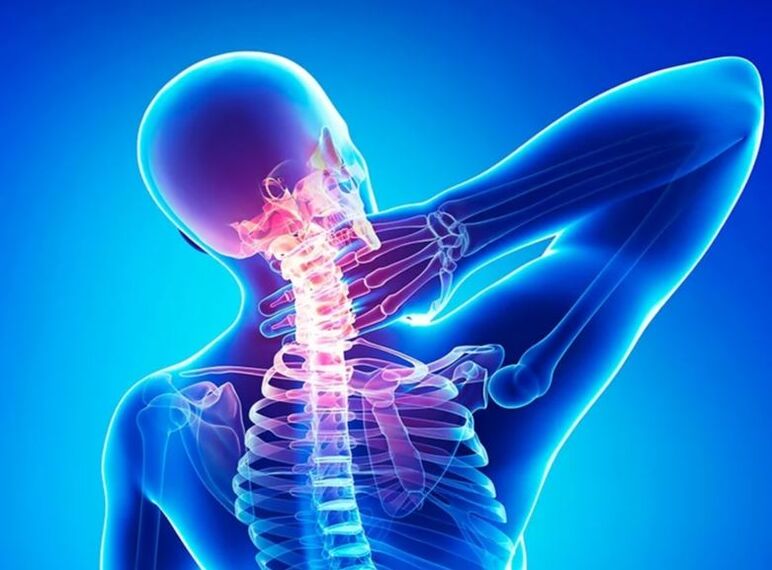
Description of the disease
Osteochondrosis is the pathological condition of the spine's bone cheating tissue.Disease, dystrophic changes and intervertebral disks are characterized by the reduction of shock of shock.Due to the decline in pathological, intervertebral disks, due to the decisions of the capacity of the spinal column, as well as in the tone of the tone of the vertebrate muscles and ligaments.
Depending on the localization of dysthic changes, several forms of osteocondrosis are different: cervical, chest, Lomber, sacral.One of the most common is a cervical osteocondrosis (up to 25% only 25%).The disease is accompanied by unpleasant feelings that significantly reduce the quality of human life.
Attention can occur in cervical osteochondrosis in no age.At present, the disease is often in schoolchildren and students, associated with a curb lifestyle and in computer and textbooks (submissive to the wrong body position).
In the absence of treatment, Osteocondrosis is progressing, the symptoms are more clear, complications often occur: intervertebral hernia, nervous, blood circulation, hypoxia, etc.
Symptoms
With cervical osteochondrosis, inadequate nutrition of intervertebral disks of the cervical region, and the distance between them is fragile and reduces the distance between them.At the same time, the bone tissue is tended to grow and form the bone growth (osteophytes).In the next stages, the growth begins to squeeze nearby tissues, ships and nerves in the cervical region.
Cervical osteocondrosis- Chronic, gradually developing disease.Therefore, pathological symptoms are different in different stages.
- Symptoms of osteocondrosis 1st
At the initial stage of the disease, there is a slight decrease in the height of the intervert of the cervical spine.There are light symptoms in the pathology.There is concern in the neck that can spread to shoulders.In some cases, the pain in his neck can indicate itself in physical activity. - Symptoms of osteocondrosis of 2nd degree
At this stage, the height of the disk continues to decrease, the wrong growing cartilage tissue is developing protrusion.Cracks may occur in the fibrous ring.The pain begins to strengthen, it is long, can be covered with hands and waist.There is a sense of stiffness with neck shifts, a crisis and the appearance of a headache. - Symptoms of Osteocondrosis of 3rd grade
In the third stage of the disease, the formation of a fibrous ring break and intervertebral torns.The spinal column can occur to the deformation of vertebrae, dislocation or sublux.Sick, nape, neck, shoulders, or sensitivity of skin areas in their hands, the sensitivity of skin areas, the abdomen, a sharp, long pain. - Symptoms of osteocondrosis of 4th grade
In a developed stage of the disease, irreversible changes - a large number of osteophylls are developing, the structures of the intervertebral disk are gradually replaced by the wound cloth.The resulting hernia has blood vessels and nerves, a person's hypoxia, blood circulation system pathologies.The pain lasts a long time, the neck and the upper shoulder belt is immobilized, the quality of life is significantly deteriorating.
Regardless of the severity of the disease, the patient may have symptoms such as headaches, noise, nausea, different vision barriers (whiskers, blacks and pain).
Reasons
The cervical osteocondrosis occurs due to the wrong distributed load of cervical spine.At the same time, the neck muscles cannot cope with the mechanical pressure, which caused blood circulation disorder.This degenerative changes are in the upper spine.
Contributing factors for the development of osteocondrosis of cervical spine:
- hereditary tendency;
- neck injury;
- Seated lifestyle;
- Stay in a long position - on the computer, driving, etc.;
- Romatoid arthritis, systematic lupus eritematosus, with the presence of autoimmune diseases,
- scleroderma;
- violation of metabolism;
- Endocrine diseases - Gut, diabetes;
- Excessive body weight.
Diagnosis
If there is a doubt of having cervical osteochondrosis, you need to contact a medical institution in a timely manner.Comprehensive diagnosis will help you to identify, assess and appreciate and understand the reasons for the development of pathology.The tension of cervical muscles with osteocondrosis is recorded in the basis of inspection and palpation - the tension of cervical muscles with osteocondrosis, in some cases the deformation of the spine is noticeable.
After the objective diagnosis, the doctor sends the patient to additional work.
The following diagnostic methods are used to confirm the diagnosis:
- Magnetic Resonance Tomography;
- radiography (lateral and straight);
- Multilayer computer tomography.
To determine the reason for the development of pathology, the ultrasonic examination of nearby bodies, heart extraction, blood vessels, blood vessels, blood vessels and urine urine are added.
Therapeutic treatment
The disease with timely detection of cervical osteocondrosis gives a good loan.Unfortunately, osteocondrosis cannot be treated completely, but therapy will help prevent further development of the disease, comfortable symptoms and normalize the mobility of the upper spine.
The following methods are used for this:
- Drug treatment.Drugs eliminate pain and inflammation, restore blood circulation and eliminate cramps in neck muscles.To do this, the following medicinal groups can be used: glucocorticosteroids, analgesic, slow-ammunition medications, muscle flow, etc.
- Physiotherapy treatment.Relaxing cervical muscles, relieve cramps and help physiotherapeic procedures to normalize blood circulation: massage, acupuncture, laser effect, magnitude, uhf therapy, phonophoresis, etc.
- Therapeutic gymnastics.Special physical exercises will help the patient to strengthen the muscle frame, align the posture and improve blood supply to the upper part of the spinal column.
Surgery
Cervical spine is required for the effectiveness of advanced stages or conservative methods of osteocondrosis.
Depending on a special clinical work, the following surgery methods can be used:
- Small invasive removal of vertebrate hernia.
- Laminectomy is an operation to remove vertebral processes.
- Suspension of a hernia with a system consisting of four titanium screws and two peaks of sticks and suspension of the operated segment.
- Endoscopic removal of a breach.



















